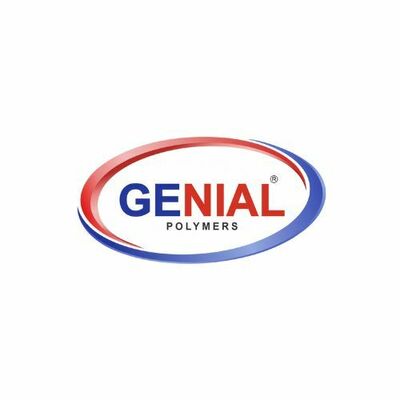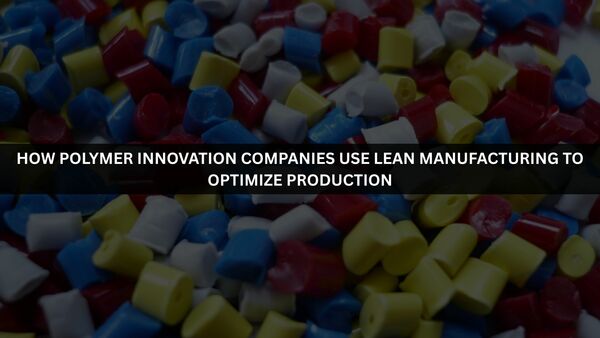In today’s competitive and sustainability-focused industrial landscape, polymer manufacturers are under immense pressure to improve efficiency, reduce costs, and enhance product quality without compromising innovation. This is where lean manufacturing has emerged as a game-changing approach. Originally developed by the automotive industry, lean principles have proven highly effective in polymer production, helping companies streamline their operations and stay competitive in an evolving market.
Lean manufacturing is not just a set of tools—it is a mindset that emphasizes continuous improvement, waste elimination, and value creation. For a polymer innovation company, integrating lean practices can drive significant improvements in throughput, material utilization, and overall operational agility. These benefits not only lead to cost savings but also allow for faster development and deployment of advanced polymer solutions.
The Value of Lean in Polymer Production
Polymer manufacturing involves complex processes—from compounding raw materials and extrusion to injection molding and finishing. Each stage presents opportunities for inefficiency, whether it’s excess inventory, machine downtime, overproduction, or quality defects. Lean manufacturing targets these inefficiencies by identifying non-value-added activities and systematically removing them from the production flow.
The goal is to create a seamless, predictable, and responsive production environment where resources are used optimally, and products are delivered precisely when needed. For companies focusing on polymer innovation, such streamlined operations are crucial, especially when developing new formulations or rapidly scaling up for customer-specific projects.
Building a Culture of Continuous Improvement
One of the most powerful elements of lean manufacturing is its emphasis on continuous improvement, often referred to as “Kaizen.” In polymer production facilities, this involves encouraging employees at all levels to identify inefficiencies, suggest improvements, and participate in implementing changes.
Fostering a lean culture means shifting from reactive problem-solving to proactive process management. Operators, engineers, and managers work collaboratively to analyze workflow bottlenecks, equipment performance, and quality metrics. This approach not only drives operational excellence but also enhances employee engagement and accountability.
A polymer innovation company that embraces this culture benefits from the agility needed to meet shifting market demands, pilot new materials, or respond to regulatory changes swiftly and efficiently.
Eliminating Waste Without Sacrificing Quality
The core principle of lean manufacturing is the elimination of waste—defined as anything that does not add value from the customer’s perspective. In polymer production, this can include surplus raw materials, energy consumption, rework due to defects, and idle machine time.
Lean practices address these issues through methods like value stream mapping, 5S workplace organization, total productive maintenance (TPM), and standardized work instructions. By applying these techniques, manufacturers can reduce downtime, improve consistency, and minimize the environmental impact of their operations.
For instance, many polymer processors now use predictive maintenance systems to monitor equipment health and prevent unplanned breakdowns. Others have optimized material handling systems to ensure the right quantity of material reaches the right machine at the right time—reducing spillage, contamination, and storage costs.
Implementing such improvements enables a polymer innovation company to deliver higher-quality products at lower costs, reinforcing its competitive edge in a demanding market.
Reducing Lead Time and Increasing Responsiveness
Speed is a critical factor in the polymer industry, particularly for companies developing new materials for rapidly evolving applications such as electric vehicles, medical devices, and sustainable packaging. Lean manufacturing helps reduce lead times by eliminating unnecessary steps in the production process and improving workflow synchronization.
Takt time analysis, cell-based manufacturing, and pull systems like Kanban ensure that production is closely aligned with real-time demand. This means that products are manufactured just in time for delivery, minimizing inventory holding and enhancing responsiveness to customer needs.
For a polymer innovation company, shorter lead times translate into faster project turnaround, which is essential when clients expect rapid prototyping and iterative testing. Being able to move quickly from concept to commercial production without sacrificing quality is a strategic advantage in today’s competitive marketplace.
Standardization and Quality Control
Consistency is paramount in polymer production. Variations in material properties, processing parameters, or environmental conditions can result in defects that compromise performance or compliance. Lean manufacturing addresses this through standardization and built-in quality controls.
By defining best practices for machine settings, material mixing, cooling cycles, and inspection protocols, companies can reduce process variability and enhance repeatability. Visual management tools and quality checkpoints at every stage help catch defects early and reduce the cost of non-conformance.
When innovation is the focus, maintaining quality while experimenting with new blends, additives, or recycling content becomes even more challenging. A polymer innovation company must rely on lean tools to maintain control over the production process while pushing the boundaries of material science.
Leveraging Data for Smarter Decision-Making
Modern lean manufacturing goes hand-in-hand with data-driven decision-making. By capturing and analyzing key performance indicators (KPIs) such as cycle times, yield rates, and energy consumption, polymer producers can uncover insights that guide continuous improvement.
Digital dashboards and manufacturing execution systems (MES) provide real-time visibility into plant operations, allowing for quicker adjustments and better resource planning. For example, if a production line consistently underperforms, root cause analysis can be conducted to determine whether the issue lies in tooling, operator training, or raw material inconsistency.
A polymer innovation company that integrates lean with smart factory technologies gains a powerful edge. Not only can it optimize current operations, but it can also innovate more effectively by using data to validate new materials and fine-tune process parameters during R&D phases.
Sustainability Through Efficiency
Sustainability is a growing priority in polymer manufacturing, driven by regulatory pressures and consumer expectations. Lean practices support sustainability by reducing waste, lowering energy consumption, and improving material efficiency.
For instance, by minimizing scrap generation and maximizing regrind usage, companies can reduce their reliance on virgin raw materials. Lean initiatives also help reduce packaging waste and improve logistics efficiency by optimizing transport loads and warehouse layouts.
These improvements not only reduce the environmental footprint but also contribute to cost savings and brand value. In a world where sustainability can influence purchasing decisions, a polymer innovation company that aligns lean with green stands to gain both commercially and ethically.
Looking Ahead: Lean as a Catalyst for Innovation
The polymer industry is at the crossroads of innovation and efficiency. As demand grows for lightweight, durable, and sustainable materials, the ability to deliver high-performance solutions at scale becomes critical. Lean manufacturing is not just a means to cut costs—it is a strategic enabler of innovation.
By embedding lean principles across production, R&D, and supply chain functions, polymer manufacturers can unlock new levels of flexibility and performance. They can iterate faster, respond quicker, and meet customer expectations more effectively.
For any polymer innovation company, adopting lean is a long-term commitment that transforms not just how products are made, but how value is delivered. It is a journey toward smarter, cleaner, and more responsive manufacturing—where every action serves a purpose, and every improvement propels the business forward.














































